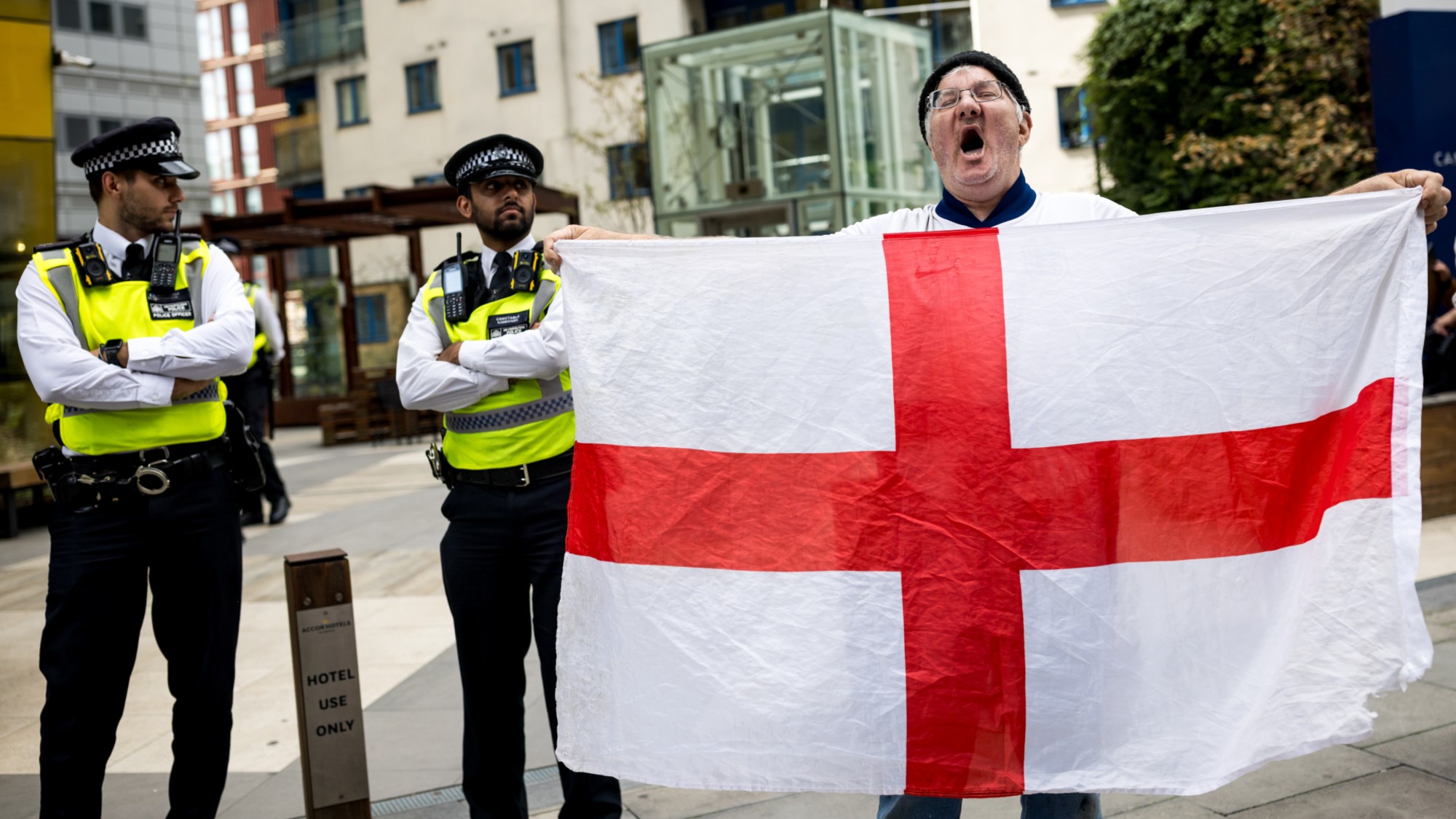Why is the England flag so controversial?
St George's Cross is appearing on streets across the country

A free daily email with the biggest news stories of the day – and the best features from TheWeek.com
You are now subscribed
Your newsletter sign-up was successful
The St George's Cross has been popping up across the country in recent weeks, causing a "headache for councils", said the BBC.
It started with people flying the England flag to "cheer on the Lionesses" during the Euros, but now "thousands more have appeared". The groups responsible say "they are motivated by pride and patriotism", but others fear it is "provocative at a time when tensions are running high across England over immigration".
One fundraising group hoping to display St George flags across a village in Worcestershire said flying England's national flag was "not racist", "never has been" and "never will be". The Wythall Flaggers have already adorned some lamp-posts in the village with flags, some of which were subsequently taken down. The local Reform-led council initially said it would remove the flags over concerns for motorists' safety, but later retracted its statement and said they would remain.
The Week
Escape your echo chamber. Get the facts behind the news, plus analysis from multiple perspectives.

Sign up for The Week's Free Newsletters
From our morning news briefing to a weekly Good News Newsletter, get the best of The Week delivered directly to your inbox.
From our morning news briefing to a weekly Good News Newsletter, get the best of The Week delivered directly to your inbox.
West Midlands Police has also opened an investigation after a man painted a St George's Cross on a mini-roundabout in the area, while a flurry of flags put up in the Birmingham suburb of Weoley Castle and Northfield were quickly removed by the city council over safety concerns.
Authorities in Tower Hamlets said all flags would be removed from council property in the London borough, which has become a "flashpoint for anti-migrant protests", said The Guardian.
Who was St George?
Chosen as England's patron saint in 1350 by King Edward III, the historical St George was a Greek-speaking Roman soldier born in modern-day Turkey who never actually set foot on British shores. St George's Day, on 23 April, marks the date of his execution in 303 for refusing to recant his Christianity.
He was popular among European knights and English kings, and is also the patron saint of Catalonia, Georgia, Lithuania, Palestine, Portugal, Germany, Greece, Moscow, Istanbul and Genoa, although not all have adopted his red and white banner.
A free daily email with the biggest news stories of the day – and the best features from TheWeek.com
Why is it so controversial to fly the St George's Cross?
A YouGov survey of around 2,000 people last year examined how Britons viewed flying the English flag. It found that 57% of those polled had a favourable view of flying the St George's Cross. However, a higher proportion (27%) found flying the English flag unfavourable compared to the Scottish flag (19%) and Welsh flag (18%).
A similar survey in 2012 carried out by the think tank British Future as part of a report into how people around the UK viewed their national identity, revealed almost a quarter (24%) of the 1,479 English respondents said they considered their flag to be racist, compared to just 10% of the 556 Scots respondents and 7% of the 565 Welsh respondents. At the time, the report blamed the "extreme street hooligans of the English Defence League" for having "toxified" the St George's Cross, although it said politicians should also take responsibility for failing to "speak up for the inclusive patriotism of the English majority".
The Union Flag and the St George's Cross "have been tainted by association with the far-right", said The Independent's David Barnett during the 2018 World Cup. "Nobody seems surprised any more to see some bull-headed idiot draped in the flag and performing a Nazi salute."
What is the law on flying the St George's Cross?
Changes made to regulations in 2012 widened the range of flags you can fly in Britain without the consent of local planning authorities. UK residents are currently permitted to fly any national flag or any international organisation's flag, as well as many different regional flags. Before the changes, it was illegal to fly a national flag without permission from a local council, unless flown from a vertical flagpole.
According to the government, all flags must be displayed in a safe condition; have the permission of the owner of the site on which they are displayed; not obscure, or hinder the interpretation of official road, rail, waterway or aircraft signs; and be removed carefully if asked by the planning authority.
Although there is no specific offence related to flying the St George's Cross on your car, you could commit an offence if it is obstructing your view or if there is a risk that the flag could fall off and damage you or the car. Last year, black cab drivers "called for a 'bonkers' ban on displaying patriotic material to be overturned" after Transport for London stopped them from flying the flag on their cabs "under a ban on signs and advertising", said The Telegraph.
Richard Windsor is a freelance writer for The Week Digital. He began his journalism career writing about politics and sport while studying at the University of Southampton. He then worked across various football publications before specialising in cycling for almost nine years, covering major races including the Tour de France and interviewing some of the sport’s top riders. He led Cycling Weekly’s digital platforms as editor for seven of those years, helping to transform the publication into the UK’s largest cycling website. He now works as a freelance writer, editor and consultant.